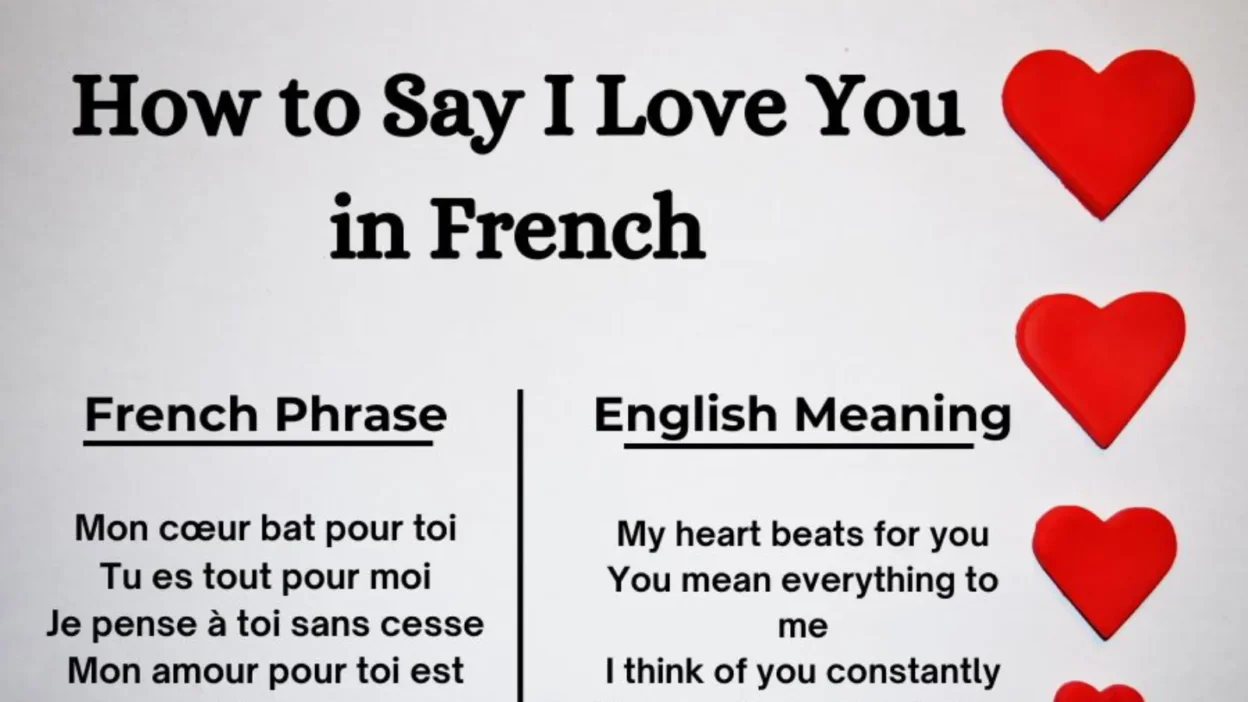If you’ve ever wondered how to say I love you in French, you’re in for a romantic journey through one of the most beautiful languages in the world. The classic phrase “Je t’aime” is the most common way to express love in French, but there are many other sweet, poetic, and heartfelt ways to say it depending on the tone, context, and relationship.
Knowing how to say I love you in French helps you connect more deeply with the language, culture, and people—whether you’re speaking to a partner, a friend, or even writing a love letter.
French is truly the language of love, and mastering these expressions can make your words unforgettable.
I Love you in French
Let’s explore 15 heartfelt and culturally rich ways to say I love you in French, complete with real conversation examples and the stories behind the words.
15 Ways to Say I Love You in French (with Meaning & When to Use)
| # | French Phrase | Meaning in English | When to Use |
|---|---|---|---|
| 1 | Je t’aime | I love you | Most common romantic expression |
| 2 | Je t’aime beaucoup | I love you very much | Sweet, affectionate, less intense |
| 3 | Je t’aime tellement | I love you so much | Deep and emotional love |
| 4 | Je t’aime de tout mon cœur | I love you with all my heart | Very romantic and heartfelt |
| 5 | Je suis amoureux/amoureuse de toi | I am in love with you | Confessing love (amoureux = male, amoureuse = female) |
| 6 | Tu es l’amour de ma vie | You are the love of my life | Very romantic and serious |
| 7 | Je t’adore | I adore you | Warm, sweet; for partners, family, or close friends |
| 8 | Tu me manques | I miss you | When you miss their presence |
| 9 | Je tiens à toi | I care about you | Emotional and meaningful |
| 10 | Tu comptes beaucoup pour moi | You mean a lot to me | Gentle, affectionate |
| 11 | Je suis à toi | I am yours | Romantic, intimate |
| 12 | Mon cœur est à toi | My heart belongs to you | Poetic and loving |
| 13 | Tu es tout pour moi | You are everything to me | Intense emotional love |
| 14 | Je ne peux pas vivre sans toi | I can’t live without you | Very dramatic and passionate |
| 15 | Pour toujours, je t’aimerai | I will love you forever | Deep promise of long-term love |
1. Je t’aime — I love you
Origin:
The classic expression. “Je t’aime” literally means I love you and is used in romantic relationships. It’s simple, powerful, and the go-to phrase for French lovers.
Example:
👤 User A: Tu sais… je t’aime.
👤 User B: Moi aussi, je t’aime.
Use: Romantic, serious love (partner, spouse, deep relationship).
2. Je t’aime bien — I like you (a lot)

Origin:
Adding “bien” softens the phrase. In French, this actually means you like someone but not romantically—so be careful!
Example:
👤 User A: Tu me plais. Je t’aime bien.
👤 User B: Ah bon ? Moi aussi, t’es sympa !
Use: Friendly, platonic affection.
3. Je t’adore — I adore you
Origin:
Common in both romantic and friendly contexts. It’s emotional and passionate, but slightly less intimate than “Je t’aime”.
Example:
👤 User A: Franchement, je t’adore.
👤 User B: C’est trop mignon, merci !
Use: Close friends, lovers, or family. Sweet and expressive.
4. Je suis amoureux/amoureuse de toi — I’m in love with you
Origin:
This is a deeper admission of being emotionally involved. “Amoureux” is masculine, “amoureuse” is feminine.
Example:
👤 User A: Je suis amoureux de toi depuis longtemps.
👤 User B: Oh… moi aussi.
Use: Emotional confession, romantic context.
5. Tu me rends heureux/heureuse — You make me happy
Origin:
A poetic, affectionate way to express the joy someone brings to your life.
Example:
👤 User A: Tu sais quoi ? Tu me rends heureuse.
👤 User B: Et toi, tu es mon bonheur.
Use: Deep love, meaningful relationships.
6. Je tiens à toi — I care about you

Origin:
This phrase expresses emotional attachment. It shows you value someone without necessarily implying romance.
Example:
👤 User A: Je tiens beaucoup à toi.
👤 User B: C’est gentil, moi aussi.
Use: Romantic or deep friendships.
7. Tu comptes beaucoup pour moi — You mean a lot to me
Origin:
Used to show someone’s importance in your life. It’s heartfelt and honest.
Example:
👤 User A: Tu comptes énormément pour moi, tu sais.
👤 User B: Merci… ça me touche beaucoup.
Use: Romantic, platonic, or family.
8. Je suis fou/folle de toi — I’m wild about you
Origin:
“Fou” (masculine) or “folle” (feminine) means unbelievable—used to express infatuation or intense passion.
Example:
👤 User A: Je suis folle de toi… depuis toujours.
👤 User B: Et moi donc ! Je t’aime à la folie.
Use: Romantic, often passionate love.
9. Je t’aime à la folie — I love you like wild

Origin:
An idiomatic French way to show passionate love—”to madness.”
Example:
👤 User A: Je t’aime à la folie !
👤 User B: Moi aussi, t’es mon obsession.
Use: Very strong romantic feelings.
10. Je te kiffe — I’m crushing on you (slang)
Origin:
Youth slang derived from Arabic “kif.” Very common in French pop culture and among teens.
Example:
👤 User A: Franchement, je te kiffe grave.
👤 User B: Sérieux ? Je croyais que t’étais timide !
Use: Informal, flirty, young love.
11. Mon cœur bat pour toi — My heart beats for you
Origin:
Romantic and poetic. This is often used in love letters, songs, or dramatic confessions.
Example:
👤 User A: Chaque fois que je te vois, mon cœur bat pour toi.
👤 User B: C’est la plus belle chose qu’on m’ait dite.
Use: Romantic, poetic expression.
12. Tu es l’amour de ma vie — You are the love of my life
Origin:
Direct translation of the English phrase. Deep, eternal love often seen in films and vows.
Example:
👤 User A: Tu es l’amour de ma vie, je le sais.
👤 User B: Je le sens aussi, depuis toujours.
Use: Long-term, committed love.
13. Je veux passer ma vie avec toi — I want to spend my life with you

Origin:
Used during proposals or serious relationships. It expresses long-term commitment.
Example:
👤 User A: Je veux passer ma vie avec toi. Tu veux m’épouser ?
👤 User B: Oui, mille fois oui !
Use: Romantic, serious relationships.
14. Mon chéri / ma chérie — My darling / sweetheart
Origin:
Common French pet names. “Chéri” for males, “chérie” for females.
Example:
👤 User A: Tu me manques, ma chérie.
👤 User B: Toi aussi, mon chéri. Reviens vite.
Use: Everyday love between couples.
15. Je t’aime de tout mon cœur — I love you with all my heart
Origin:
A beautiful expression of complete emotional devotion. Often used in letters, anniversaries, or special moments.
Example:
👤 User A: Je t’aime de tout mon cœur, ne l’oublie jamais.
👤 User B: Je n’oublierai jamais… je t’aime aussi.
Use: Deep emotional and lasting love.
FAQs
1. What is the most common way to say I love you in French?
The most common phrase is “Je t’aime.”
2. How do I pronounce “Je t’aime”?
It is pronounced: zhuh tem (soft and gentle).
3. Is “Je t’aime” romantic or friendly?
Romantic. It’s usually said to a partner, girlfriend, boyfriend, or spouse.
4. How do I say I love you very much?
Say “Je t’aime beaucoup.” — though note, this feels slightly less romantic and more affectionate.
5. How do I say I love you passionately?
Say “Je t’aime de tout mon cœur.” (I love you with all my heart)
6. How do I say I love you to family or close friends?
Use “Je t’adore.” (I adore you / I love you deeply, but not romantic)
7. How do I say I love you in a formal way?
French usually does not express love formally.
But you can say: “Je vous aime.” (polite plural or formal you)
8. How do I say I miss you in French?
Say “Tu me manques.” (You are missing from me — emotional and sweet)
9. How do I say I love you too?
Say “Moi aussi, je t’aime.”
10. Can I use “Je t’aime” in texts or messages?
Yes! Common versions:
- Je t’aime ❤️
- Je t’aime beaucoup 💗
- Je t’adore 💕
Conclusion:
Now that you’ve learned how to say I love you in French, you can share your feelings with elegance and charm. From the classic “Je t’aime” to more playful or poetic phrases, each expression adds depth to your emotional vocabulary.
Whether you’re speaking to someone special or simply embracing the romantic spirit of the French language, these phrases will help you express love with authenticity. Keep practicing and let your heart speak in French—the language of love. 💕



